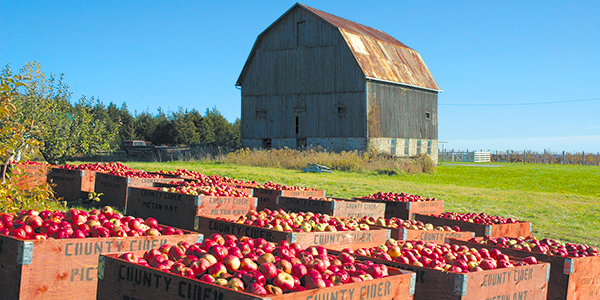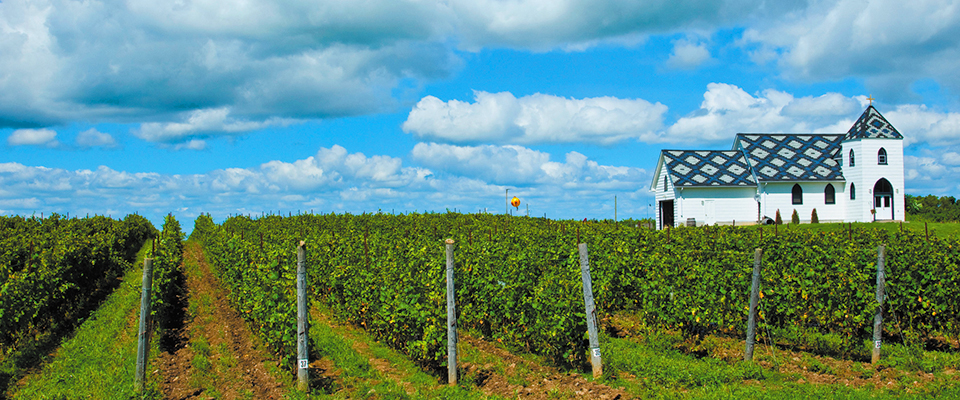Spotlight: Prince Edward County
Vacation in a recreation-rich corner of Ontario
At less than 270 square miles, Prince Edward County in southeastern Ontario might seem like an easy spot to overlook while exploring the north shore of Lake Ontario. But this small headland community packs a hefty punch when it comes to summer vacationing, annually attracting more than 100,000 visitors on the prowl for charming lakeside towns, quiet campgrounds and world-renowned parks.
The appeal isn’t a new trend either. As you kick about Prince Edward County’s abundance of parks and trails you might be lucky enough to find a fluted spear point, left behind by the region’s first inhabitants who swept into the area with the retreat of ice-age glaciers 12,000 years ago. Since that time, the Prince Edward County headland has been populated by hunter-gatherers, prehistoric farmers, and the Iroquois and the Mississauga Indians. British, French and Dutch fur traders appeared on the scene in the 17th century, sparking periodic trade wars and often drawing in military intervention.
When the area fell under British rule, it was decided that no European settlement was allowed, in a measure to ensure peace. But the appeal of Prince Edward County, it would seem, was too great. Following the American Revolution, Loyalists moved north and began settling on the headland near modern-day Prinyer Cove. The next 200 years brought with them the gradual development of a thriving agricultural industry, which today is paired with a thriving tourism industry.

Prince Edward County
Edward’s Abundance
As you move about the headland from campsite to campsite and town to town (often on picturesque, unpaved country roads), both farm stands and farmland vistas line the way. Charm is the defining characteristic of this rural community. The manmade attractions here are humble, to say the least.
Birdhouse City, near Fawcettville, is one such attraction. Tucked into the northern edges of Macaulay Mountain Conservation Area, Birdhouse City consists of more than 100 ornately decorated and designed birdhouses. Many are miniatures modeled after world-famous buildings. They sit atop tall poles jammed into the ground along the roadside and annually attract thousands upon thousands of curious shutterbugs.
Not far from Birdhouse City is the Glenora Ferry, another of the headland’s humble manmade attractions. Every half-hour the ferry makes the short hop across the water to Adolphustown, linking the route between Prince Edward County and Kingston further east. The ride is short but incredibly scenic.
Prince Edward County’s truly world-class attractions, though, are all found in the natural environment. Three provincial parks and 14 conservation areas are found on the headland. Whatever your preferred recreational activity is Prince Edward County has the natural terrain to accommodate. Kayaking, canoeing, fishing, hiking and even cross-country skiing are all popular pastimes here.
Start with a trip to Sandbanks Provincial Park, which can be found near West Lake on the southwestern shores of the headland. Sandbanks is home to the largest formation of baymouth sandbar dunes, a type that completely closes off an inland bay from a larger body of water.
Sandbanks is a popular summer destination due to its three nationally renowned beaches, often cited as the best in the country. A robust network of walking and hiking trails are also available to explore. The park’s visitor center houses exhibits about the unique geological history of the area, and during the summer months it organizes daily guided hikes, talks and educational programs for kids.

Dwayne Brown Studio
A Mysterious Lake
On the northwestern side of the headland, near Glenora, Lake on the Mountain Provincial Park is another popular destination. On all scientific grounds, the Lake on the Mountain is a geological abomination. It sits near the headland coast and the Bay of Quinte, but at a height of 200 feet. There’s no consensus on how the lake formed or, since it has no known water source, how it manages a constant flow of clean water. It certainly makes for one of the more dramatic natural settings one could ever hope to find.
Most theories on the formation of Lake on the Mountain revolve around the county’s limestone bedrock. And while the jury is still out on that, we do know for sure that the headland’s limestone-enriched soil is the reason behind Prince Edward County’s booming, award-winning wine industry.
More than 40 wineries now call the headland home. A self-guided tasting trail is sponsored by the local community and takes visitors on a whirlwind tour of barn-house tasting rooms and wine cellars.
Take the time to stop and explore this often overlooked but richly rewarding headland community.
For More Information





